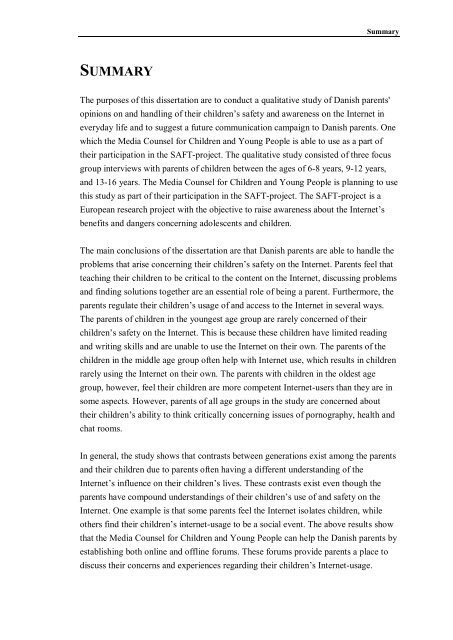Internettet - nyt medie, nye problematikker? - Medierådet for Børn og ...
Internettet - nyt medie, nye problematikker? - Medierådet for Børn og ...
Internettet - nyt medie, nye problematikker? - Medierådet for Børn og ...
You also want an ePaper? Increase the reach of your titles
YUMPU automatically turns print PDFs into web optimized ePapers that Google loves.
SUMMARY<br />
Summary<br />
The purposes of this dissertation are to conduct a qualitative study of Danish parents'<br />
opinions on and handling of their children’s safety and awareness on the Internet in<br />
everyday life and to suggest a future communication campaign to Danish parents. One<br />
which the Media Counsel <strong>for</strong> Children and Young People is able to use as a part of<br />
their participation in the SAFT-project. The qualitative study consisted of three focus<br />
group interviews with parents of children between the ages of 6-8 years, 9-12 years,<br />
and 13-16 years. The Media Counsel <strong>for</strong> Children and Young People is planning to use<br />
this study as part of their participation in the SAFT-project. The SAFT-project is a<br />
European research project with the objective to raise awareness about the Internet’s<br />
benefits and dangers concerning adolescents and children.<br />
The main conclusions of the dissertation are that Danish parents are able to handle the<br />
problems that arise concerning their children’s safety on the Internet. Parents feel that<br />
teaching their children to be critical to the content on the Internet, discussing problems<br />
and finding solutions t<strong>og</strong>ether are an essential role of being a parent. Furthermore, the<br />
parents regulate their children’s usage of and access to the Internet in several ways.<br />
The parents of children in the youngest age group are rarely concerned of their<br />
children’s safety on the Internet. This is because these children have limited reading<br />
and writing skills and are unable to use the Internet on their own. The parents of the<br />
children in the middle age group often help with Internet use, which results in children<br />
rarely using the Internet on their own. The parents with children in the oldest age<br />
group, however, feel their children are more competent Internet-users than they are in<br />
some aspects. However, parents of all age groups in the study are concerned about<br />
their children’s ability to think critically concerning issues of porn<strong>og</strong>raphy, health and<br />
chat rooms.<br />
In general, the study shows that contrasts between generations exist among the parents<br />
and their children due to parents often having a different understanding of the<br />
Internet’s influence on their children’s lives. These contrasts exist even though the<br />
parents have compound understandings of their children’s use of and safety on the<br />
Internet. One example is that some parents feel the Internet isolates children, while<br />
others find their children’s internet-usage to be a social event. The above results show<br />
that the Media Counsel <strong>for</strong> Children and Young People can help the Danish parents by<br />
establishing both online and offline <strong>for</strong>ums. These <strong>for</strong>ums provide parents a place to<br />
discuss their concerns and experiences regarding their children’s Internet-usage.


